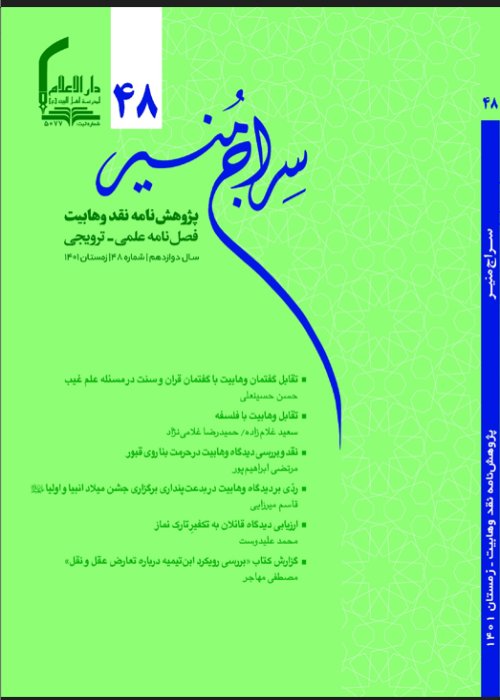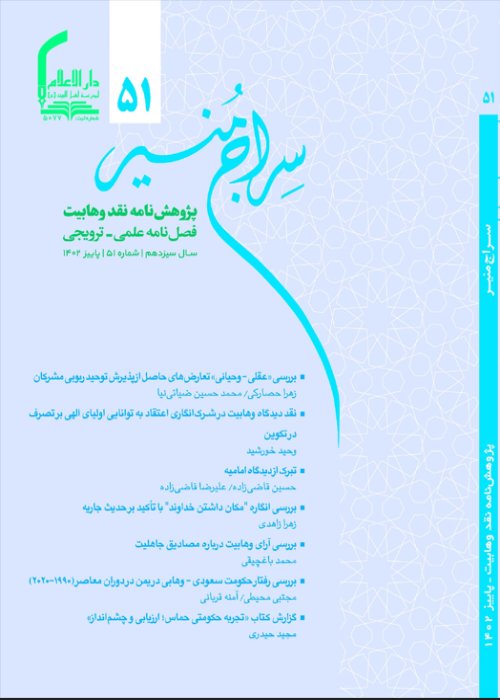فهرست مطالب

نشریه سراج منیر
سال دوازدهم شماره 48 (زمستان 1401)
- تاریخ انتشار: 1402/09/22
- تعداد عناوین: 6
-
صفحات 9-34یکی از باورهای مهم وهابیت، کفر و شرک خواندن نفس علم غیب غیرخداست. این ادعای وهابیان ریشه در طاغوت خواندن مدعی علم غیب دارد. آیات نفی علم غیب از غیرخدا، از دلایلی است که وهابیان برای اثبات ادعای خویش به آن استناد می کنند. استناد وهابیت به این آیات قرآن، دچار مشکلات اساسی است: اول آن که آیات قرآن در تبیین علم غیب چند دسته است: یکی از آنها، آیاتی است که وهابیان به آن استناد می کنند و آنان از آیات دیگری که علم غیب را برای غیرخدا اثبات می کند، چشم پوشی کرده اند. بنابراین، استناد وهابیت به آیات نفی علم غیب از غیرخدا، نوعی قشری گری و نادیده گرفتن آیات دیگر قرآن است. دوم آن که روایات صحیح فراوانی در منابع شیعه و سنی وجود دارد که علم غیب به غیرخدا نسبت داده شده است. سوم آن که نصوص قرآنی و روایی نسبت دادن علم غیب به غیرخدا را مخصوص انبیا(ندانسته و برخی از صالحان را نیز در زمره ی دارندگان علم غیب شمرده است. لذا ادعای وهابیت در کفر و شرک و طاغوت خواندن علم غیب غیرخداوند، با نصوص دینی تضاد دارد.کلیدواژگان: علم غیب، وهابیت، آیات علم غیب، روایات علم غیب، پیامبران، صالحان
-
صفحات 35-51
وهابیان با هرگونه آموزش و یادگیری فلسفه مخالف اند؛ علاوه بر این تکفیر و ملحد خواندن فلاسفه از سخنان و فتاوای رایج در میان وهابیان است. گرچه آنان تلاش کرده اند ستیز خود با فلسفه و فلاسفه را علمی و مستدل جلوه دهند، لکن ارزیابی سخنان و دلایل وهابیان این نتیجه را به دست می هد که نقص تصوری وهابیان از مفاهیم فلسفی، سوء برداشت آنان از متون فلسفه، در کنار تعصبات عقل ستیزانه، بیشترین تاثیر را در تخطیه و ستیز وهابیان با فلسفه و فلاسفه داشته است. به نظر می رسد تکفیر فلاسفه و تحریم فلسفه از سوی وهابیان بیش از آن که مبنای علمی داشته باشد، بر پایه تعصبات و نسبت های ناروا استوار است. در این نوشته، با روشی توصیفی تحلیلی، نظریات مخالفان فلسفه بررسی و نقد شده است.
کلیدواژگان: فلسفه، وهابیان، عقل، تکفیر -
صفحات 53-73
وهابیان از اولین روزهایی که سربرآوردند، تاکنون این پندار را ترویج کرده اند که ساخت بنا روی قبور، حرام، بدعت، نماد و ذریعه شرک است. محمد بن عبدالوهاب و پیروان او بر پایه همین پندار، بناهای ساخته شده بر قبور ایمه صحابه، تابعان و بسیاری از بزرگان اهل سنت را در نقاط مختلف جهان تخریب کرده اند. اجماع، روایت ابوالهیاج و روایت جابر مهم ترین دلایل وهابیان در این مسیله است که در این مقاله مطرح شده و مورد بررسی قرار گرفته است.
کلیدواژگان: بنا روی قبور، وهابیت، روایت ابن ابی الهیاج، روایت جابر -
صفحات 75-94
برگزاری جشن میلاد نبی مکرم اسلام7 و اولیای الهی سیره ی همیشگی مسلمین در سرتاسر جغرافیای جهان اسلام، در طول قرن های متوالی بوده است که در راستای تکریم نبی مکرم اسلام صورت گرفته است. وهابیان با طرح برخی اشکالات، به بدعت بودن چنین عملی حکم کرده اند. ازجمله محوری ترین ادعاهای آنان، ترک این عمل از سوی پیامبر7 و صحابه عنوان شده است . این در حالی است که ترک فعل از سوی رسول گرامی اسلام7 به تنهایی موجب حرمت نمی شود؛ مگر این که نصی بر نهی از آن متروک اقامه شود. در مقابل، موافقان بزرگداشت موالید، این عمل را از مصادیق تعظیم شعایر الهی می دانند و دلایل متعددی از آیات قرآن، ازجمله: توصیه قرآن به لزوم یادآوری ایام الله، لزوم بزرگداشت شعایر الهی و... بر تایید چنین عملی ارایه می کنند.
کلیدواژگان: احتفال، بزرگداشت میلاد نبی اسلام، بدعت، سنت -
صفحات 95-108
«تکفیر تارک نماز» از مسایل مورد توجه فقهاست. آنان به صراحت بیان نموده اند که چنانچه ترک نماز به سبب جحد و انکار اصل وجوب نماز باشد، شخص منکر، کافر می شود؛ اما نکته مهم این است که آیا اگر ترک نماز به سبب مسیله ای غیر از جحد و انکار باشد، بازهم موجب کفر شخص تارک می شود؟ در این خصوص، نظرات مختلفی بیان شده است. هرچند که جمهور فقها و اندیشمندان اسلامی قایل به عدم کفر چنین شخصی شده اند، اما در منشورات برجا مانده از فقها می توان برخی را به عنوان قایلین به تکفیر تارک نماز (هرچند که به سبب سستی، کاهلی، تنبلی و امثال آن باشد) معرفی نمود. عمده ی تکفیریان معاصر، این نظر را پذیرفته و امروز سردمدار این دیدگاه می باشند. آنان دلایلی را برای اثبات مدعایشان مطرح نموده اند که همه ی آن ها مخدوش و ناتمام است. آنان از آیه 11 سوره مبارکه توبه و حدیث نبوی «إن بین الرجل وبین الشرک والکفر ترک الصلاه» و کاشفیت فقدان ایمان در شخص تارک نماز، برای دستیابی به مقصود خود بهره جسته اند. اما با تدقیق نظر مشخص می شود که آیه در صدد نفی اخوت حقیقی نبوده و تنها در صدد بیان شدت مبغوضیت ترک نماز می باشد. با در نظر گرفتن دیگر فرموده های پیامبر اکرم7 مشخص می شود که این کلام نبوی مربوط به ترک عامدانه نماز می باشد، نه مطلق ترک نماز؛ علاوه بر آن که میان ترک نماز و فقدان ایمان هیچ ملازمه ای وجود ندارد و برقراری چنین ملازمه ای بی دلیل و صرفا ادعایی بیش نیست.
کلیدواژگان: تکفیر، تارک الصلاه، انکار نماز -
صفحات 109-118
کتاب «بررسی رویکرد ابن تیمیه درباره تعارض عقل و نقل» توسط جناب آقای «رحمت الله رضایی» در ارتباط با نقد ابن تیمیه در دو جلد نوشته شده و از سوی «انتشارات محبین» شهر قم، در سال 1399ش منتشر شده است است. جلد اول، اختصاص به مباحث نظری «تعارض عقل و نقل» و جلد دوم، ناظر به مباحث کلامی است. جلد اول این کتاب در 454 صفحه، متشکل از نه فصل و یک نتیجه می باشد و گزارشی که می خوانید، از جلد اول این کتاب است. این کتاب از دیدگاه نگارنده ی گزارش، کتابی بسیار ارزشمند برای محققین، در زمینه شناخت سخنان ابن تیمیه و نقد و بررسی آن می باشد؛ چراکه نویسنده محترم کتاب به خوبی مواضع ابن تیمیه را تبیین و نقد کرده است.
کلیدواژگان: گزارش کتاب، ابن تیمیه، تعارض عقل و نقل
-
Pages 9-34One of the beliefs that has an important place in the Wahhabi discourse is calling someone who believe in supernatural power for someone other than God a pagon. The Wahhabists maintain that the one who claim supernatural power is a tyrant, and there are some qur'anic verses that reject the occult power for someone other than God. But we must know that there are many problems for referring this issue to the Holy Quran: Firstly, the Quranic verses regarding the occult power is different and only some of them refer to what Wahhabi claim. So, Wahhabi claim for citing the Quranic verses is a kind of selecting some verses and leaving others. Secondly, there are many correct and authoritative Hadiths in both Shia and Sunni sources, proving the occult power to someone other than God. Thirdly, according to Quranic and narrative texts, the occult powers is not dedicated only to the prophets and some saints also possess this power. So, this Wahhabi claim in rejecting the occult power for someone other than God is in contradiction with the religious texts.Keywords: : Occult Power, Wahhabism, Quranic verses, hadiths, prophets, Saints
-
Pages 35-51
Wahhabis are against any learning and education of philosophy; In addition, one of the most common fatwas of Wahhabis is labelling the philosophers as atheists. Although they have tried to present their conflict with philosophy and philosophers as scientific and well-reasoned, but according to the findings of this research, and by evaluating the Wahhabi reasons, we have found that the Wahhabis misconstrue the philosophical concepts and also they have anti-rational prejudices, this attitude had the greatest impact on Wahhabis' misunderstanding of philosophy and philosophers. It seems that the excommunication of philosophers and the banning of philosophy by the Wahhabis are based on prejudices and unfair ratios rather than having a scientific basis. In this essay, with a descriptive-analytical method, the opinions of the opponents of philosophy have been examined and criticized
Keywords: philosophy, Wahhabis, reason, Takfir -
Pages 53-73
From the first days of their existence, Wahhabis have promoted this idea that embellishing graves is forbidden, and it is a kind of Heresy and introduction to Shirk that we groom the graves. Based on this idea, Muhammad bin Abd al-Wahhab and his followers destroyed the monuments on the tomb of Imams, Companions, and many Sunni leaders in different parts of the world. In this essay and with a descriptive - analytic method, the most important reasons of Wahhabism such as the existence of consensus, the narration of Abu al-heyaj and the narration of Jaber is discussed and analyzed.
Keywords: building monuments on the graves, Wahhabism, the narration of Abu Heyaj, the narration of Jaber -
Pages 75-94
Celebrating at the birthday of the Holy Prophet of Islam and the saints of God has been the tradition of Muslims throughout the Islamic world for centuries. This is because of commemorating the Holy Prophet of Islam (PBH). The Wahhabis doubted on the legitimacy of celebrating for the birthday of Holy Prophet, claiming that the Holy Prophet and his disciples have not done this themselves. But care must be taken that this is not a legitimate reason for forbidding the act of celebration, rather we must have an explicit religious text for declaring something Haram. the supporters of commemorating the birthdays consider this act as an example of bowing down to divine rites. They provide several reasons from the verses of the Qur'an to support their views, including: the Qur'an's advice on the need to remember God's Day, the need to celebrate divine rites, and etc.
Keywords: Celebration, Commemorating the Birth of the prophet of Islam (PBH), Heresy, Tradition -
Pages 95-108
One of the issues that concerns the jurists is whether someone who abandons Praying is a pagan or not? The Muslim jurists maintain that if leaving the praying leads to denying the praying, this is Kufr. But the question is that if this do not lead to denying the act of praying, what is the verdict? The majority of jurists believe that not performing the praying without denying it, will not lead to Kufr. Most of contemporary Takfiri Groups have accepted the Takfir idea. They mention the verse (9:11) and the Holy prophet quotation: "the border between the man and Kufr is abandoning the praying". But care must be taken that in above verse the literal meaning is not intended, rather it means that abandoning the praying is hateful. With regard to quotation of the Holy prophet, this quotation is about abandoning the praying intentionally. Furthermore, there is no correlation between abandoning praying and lack of faith.
Keywords: Takfir, Abandoning the Praying, Denying the Praying -
Pages 109-118
Book report on Ibn Taymiyyah's approach on the conflict between reason and narrationThe book "Review of Ibn Taymiyyah's approach on the conflict between reason and narration" was written by Rahmatullah Rezaei in connection with Ibn Taymiyyah's criticism. This book is organized in two volumes. The first volume is devoted to the theoretical topics of "conflict of reason and narration" and the second volume is focused on theological topics.The first volume of this book is 454 pages long and decorated by Mohibin Publishing House of Qom city in 2019 AH, it consists of nine chapters and a conclusion, and the mentioned report is from the first volume of this book.From the point of view of the author of the report, this book is a very valuable book for scientific researchers in the field of understanding and criticizing Ibn Taymiyyah's words, because the respected author of the book has well explained and criticized Ibn Taymiyyah's positions.
Keywords: Book report, Ibn Taymiyyah, Conflict of reason, narration


